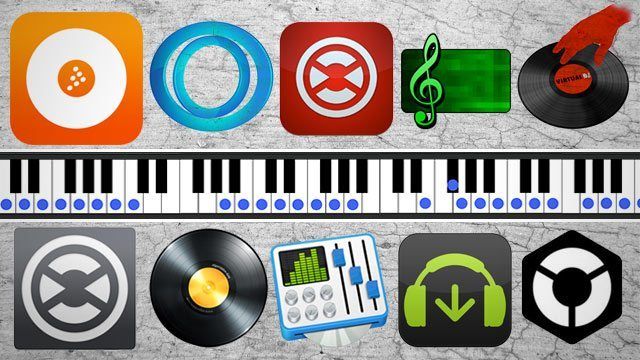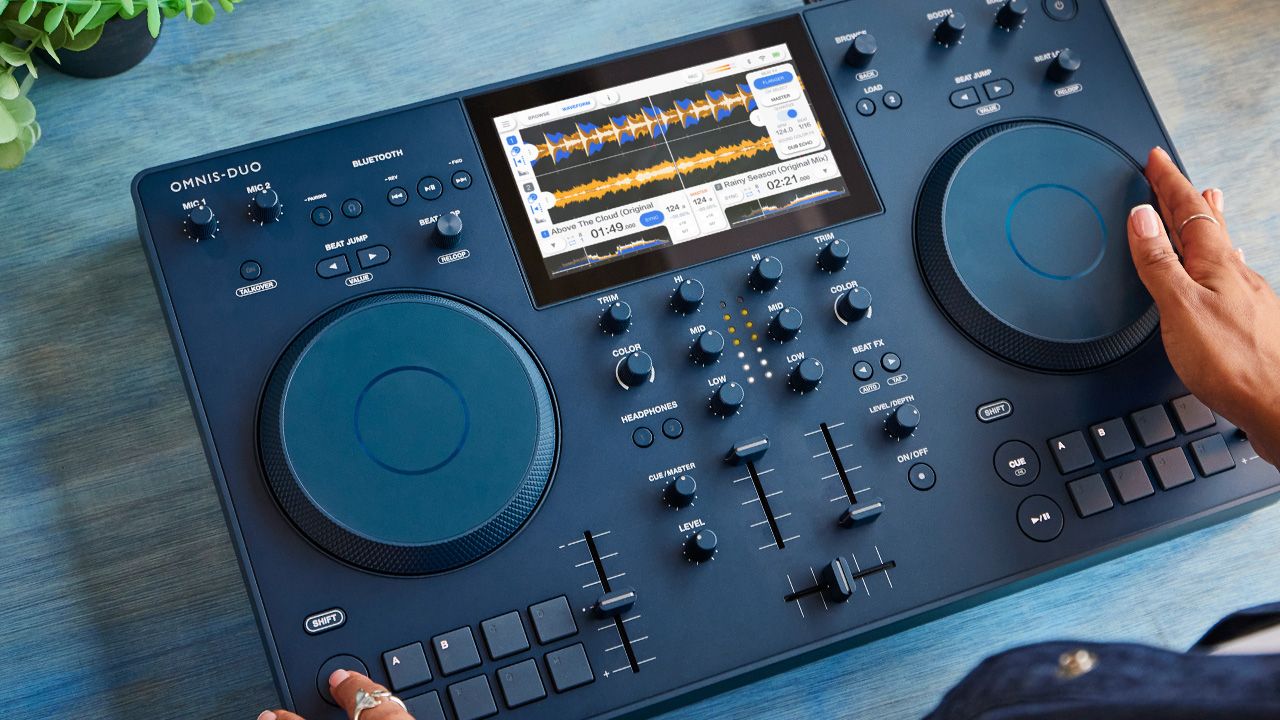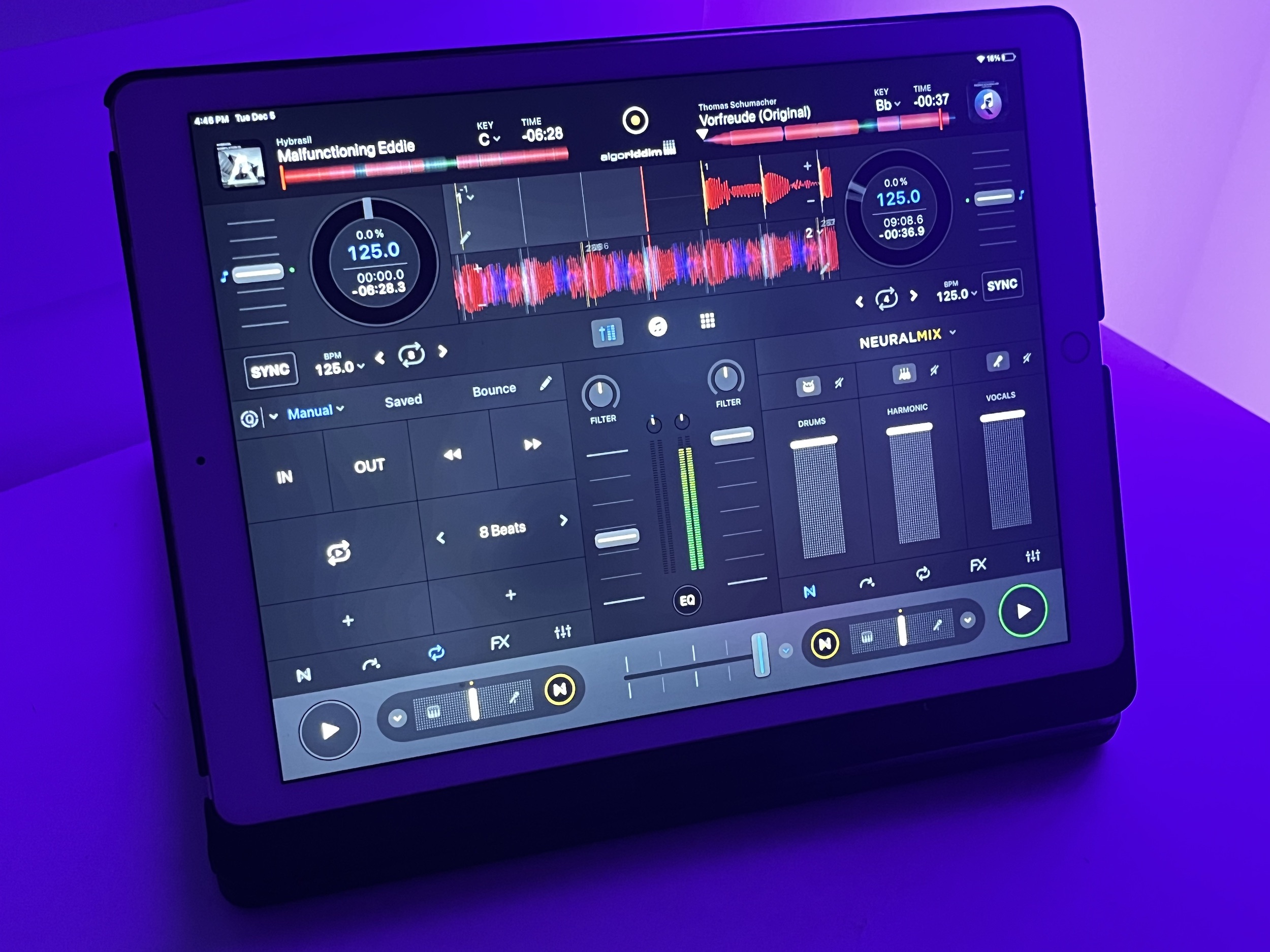Harmonic mixing has become an integral part of a lot of digital DJs arsenals, reflected by the presence of key detection algorithms in a variety of softwares. We last stood just three entrants against each other in a harmonic showdown in 2012, but this year we’ve got 12 different algorithms competing in our key detection comparison. How does Traktor Pro fare versus Traktor DJ? Is Rekordbox reliable? Is the new Mixed In Key worth an upgrade?
THE TWO TESTS
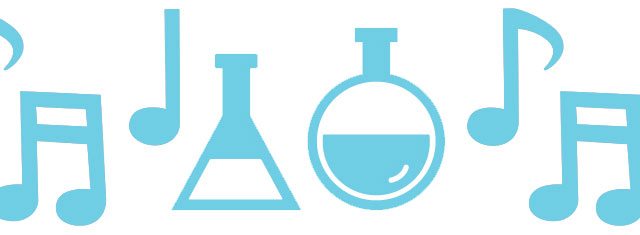
Major / Minor Triads (“Control”) – In this test, we constructed incredibly simple 30 second long songs with a drum loop and a piano playing a major or minor triad for the 24 keys. The fascinating results below show how some applications are optimized for detecting chords and others struggle with telling if they’re major or minor.
Real World Test – Instead of doing a test with music across all kinds of genres, we decided to focus on what almost each of these applications claim to do well – music that DJs are commonly playing. By that right, we took 61 of the top songs from Beatport, using all genres on the site, and ran them through our human testers and all 10 software options.
Editor’s Note: We’d really like to run a third test as another control that uses very common three chord progressions. There wasn’t time before publication but it may be added here soon.
Common errors that you’ll see notated in the results below include a mixup of major/minor – something that can be hard to detect even for a human at times, as well as “harmonically forgivable” analyses, which are off by 1 fifth. The latter error is less likely to cause DJs an issue in the mix, as there’s still a good chance that it will share many of the same notes as the track that you’re mixing in to/out of.
HUMAN BASELINE
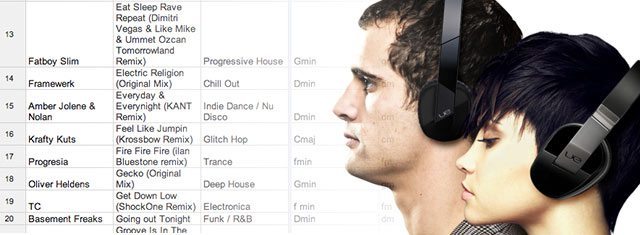
We mention the old adage “trust your ears!” in almost every single article about harmonic mixing. It’s critical to not build a dependency on tools, but instead use them to augment a sense of when something works or doesn’t.
We’ve heard from some sources that even a groups of pitch-perfect classically trained musicians have a significant rate of disagreement about the key of certain songs.
With that in mind, we’ve only used songs in our test that had a clear consensus (read: simple majority) from our human test group. Our test group included myself and 6 awesome well-suited volunteers with experienced ears (even a few perfect-pitch ears in the group) keying tracks from the DJTT community – thanks for listening to these tracks and helping out! It is possible that our ears are somewhat fallible, which is why we’re putting all of our data at the end of the article. If you disagree, feel free to make a case for a different consensus on a track in the comments.
THE COMPETITORS
Beatport’s Key Detection
Beatport has their own detected key for almost every song in their catalog – which is why we started with their own catalog as a place to source tracks. Artists aren’t given the option to report their own keys to Beatport – so even if the author has an associated key that they know they wrote the song in, it apparently gets tossed out and replaced with a detected key. The algorithm has always needed some work (“We’re still refining our BPM and Key detection” reads their support page), but if an avid fan or angry artist spots an error, they can report incorrect keys and BPMs.
Major/Minor Triad Test: Not possible – no way to manually test.
# of correct tracks (vs human volunteer consensus): 40 (66% correct)
# of Major / Minor misreads: 10
# of results off by a single fifth: 7
Mixed In Key 6.0.2
This is the most recent version of Mixed In Key’s algorithm, having first made a début hiding inside of the company’s DJ software, Flow (read our review here). The update was released at the end of December 2012, with a number of changes to the algorithm. At the time, MIK’s founder Yakov noted that the changes were significant, “the old version would group the bassline together with the lead synths, the pads, and so on. The new version can “hear” music in higher resolution, and analyzes each track in 6.83x times more detail (over 600%) because it listens to the entire piano roll.”
The 6.0 version of Mixed In Key costs $58 for new users who have never purchased a copy before, and $29.99 for users of 5.0 or earlier – and perhaps worth the money, considering the impressive results below.
Major/Minor Triad Test: Perfect 24 out of 24 – every single key correct.
# of correctly analyzed tracks (vs human consensus): 58 (95%)
# of Major / Minor Misreads: 0
# of results off by a single Fifth: 2
Mixed In Key 5.6
We make it a point to include the previous version of Mixed In Key here as a simple point of comparison – most people who own the software likely don’t own the most recent version and want to know if it’s worth updating to. This version of MIK likely performed better in this roundup than the 2012 one because this test included mostly DJ-oriented tracks.
Major/Minor Triad Test: 20 / 24 correct.
# of correctly analyzed tracks (vs human consensus): 55 (90%)
# of Major / Minor Misreads: 0
# of results off by a single Fifth: 4
Algoriddim Djay 4.2.2 (Mac)
Algoriddim’s software has been around for a while, but found major success on the iPad. Unfortunately the iOS version doesn’t have key detection, so harmonic mixing and testing the most common use of Djay isn’t possible. Instead we’ve tested it with the Mac desktop version.
Despite doing well on our rudimentary major/minor triad test, Djay struggled to have a precise analysis of the keys – often being off by just one fifth. It’ll do in a pinch, but serious harmonic mixers might need something more accurate.
Major/Minor Triad Test: 23/24
# of correctly analyzed tracks (vs human consensus): 42 (69%)
# of Major / Minor Misreads: 4
# of results off by a single Fifth: 12
Pioneer Rekordbox 2.2.0
Pioneer’s library analysis and organization software is where most CDJ-based DJs go for setting cue points, making playlists, burning CDs, and compiling flash drives for their sets. It also has built-in key detection, which makes it yet another candidate for our roundup!
One thing we found about Rekordbox was that it was painfully slow compared to all the other applications. Even loading in a single track for analysis brought the app to a crawl, making it difficult to do anything else while waiting for the results – which as it turns out aren’t that amazingly accurate. Perhaps you get what you pay for, as the Rekordbox application is a free download.
Major/Minor Triad Test: 21 / 24
# of correctly analyzed tracks (vs human consensus): 35 (57%)
# of Major / Minor Misreads: 9
# of results off by a single Fifth: 9
Keyfinder 1.25
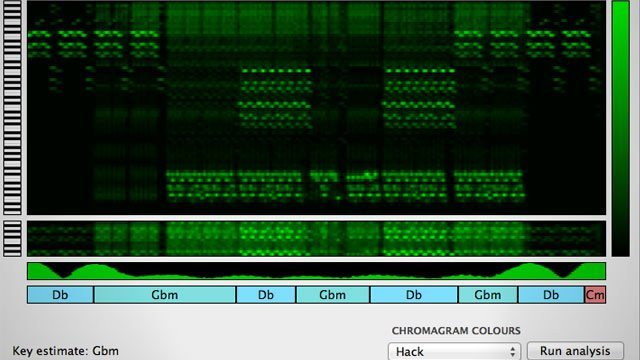
Keyfinder is the free open source answer to the paid solutions for key detection on the market. It’s cross platform, and is capable of analyzing a massive number of audio codecs and can write to metadata tags just like any larger paid option. Interestingly, the software is capable of doing a detailed analysis that displays a “chromagram” of the notes in a track and assigns a primary key for different sections of a track (see image above). Most users aren’t looking for this level of analysis – but for a completely free software, it’s probably the best value of any of the programs in this test.
Major/Minor Triad Test: 18 / 24
# of correctly analyzed tracks (vs human consensus): 47/61 (77%)
# of Major / Minor Misreads: 3
# of results off by a single Fifth: 7
Traktor Pro 2.6.6
Traktor is another recent entry to the key analysis game, having implemented key detection in Traktor Pro 2.6.1 almost one year ago. The key detection algorithm originally was shown to be roughly equal to Mixed In Key 5’s in a casual test done by the developer behind Keyfinder. In reality, we found that the software wasn’t so good at our short sample major/minor triad tracks – but absolutely crushed when it came to real world track examples.
Update: We’ve run the Traktor Pro test a third time with a brand new set of these audio files – apparently stripping ID3 tags isn’t enough to remove all of the key information from Mixed In Key. We’ve revised our results – which are actually nearly identical with Traktor DJ on iPad.
Major/Minor Triad Test: 11/24 – perhaps it requires more context than our simple tracks?
# of correctly analyzed tracks (vs human consensus): 33 (54%)
# of Major / Minor Misreads: 9
# of results off by a single Fifth: 11
Virtual DJ Pro 7.4
While we continue to wait for updates on the ever-forthcoming Virtual DJ 8 (potentially next week at NAMM), we’re forced to use the available software to judge Atomix Productions’ key detection abilities. We’re betting that VDJ8 will have an updated algorithm – and will likely do a bit better at telling major and minor triads apart than VDJ7.
Major/Minor Triad Test: 12/24
# of correctly analyzed tracks (vs humans): 40 (65%)
# of Major / Minor Misreads: 1
# of results off by a single Fifth: 14
beaTunes 3.5.17
BeaTunes 3 has been out since 2011, but since it received an update in November to the most recent version, it remains on our list of software to use for key detection and analysis. The application can actually be used for a lot of very useful automated library cleanup work in addition to key and BPM analysis – including fixing incorrectly tagged file names and ID3 tags. That being said, the key detection algorithm needs a bit of work for it to be at all reliable for DJing. The software is available for Windows and Mac OS X for $35.
Major/Minor Triad Test: 23/24
# of correctly analyzed tracks (vs humans): 27/61 (44%)
# of Major / Minor Misreads: 8
# of results off by a single Fifth: 16
Rapid Evolution 3 Beta 58
Unfortunately Rapid Evolution hasn’t seen any development since our last roundup in 2012 – but we know there are some users out there who are loyal to it still, so we included it here. The software doesn’t fair that well in the outcome.
Major/Minor Triad Test: 19/24
# of correctly analyzed tracks (vs humans): 36 (59%)
# of Major / Minor Misreads: 9
# of results off by a single Fifth: 7
Traktor DJ 1.3.3 for iPad
At the request of a few of our readers upon finding out that we were doing another key detection showdown, we’ve separated out Traktor DJ on iOS from the desktop app.
Update: Just two of the keys detected differ – meaning that there isn’t that much of an inconsistency versus Traktor Pro. Have a look at the numbers:
# of results different from Traktor Pro: 2 more incorrect
Major/Minor Triad Test: N/A – Traktor DJ can’t view our 30 second test files. We’re investigating.
# of correctly analyzed tracks (vs humans): 31 (51%)
# of Major / Minor Misreads: 10
# of results off by a single Fifth: 11
CrossDJ 1.6.1 for iPad
CrossDJ earns the title of being the other iOS application to make the list. Not only has the software expanded to the Android platform, but it continues to see numerous updates and support with regularity from a dedicated development team. Worth noting is that CrossDJ is developed by MixVibes, who are also the team behind Pioneer’s Rekordbox software.
# of results different from Rekordbox: 26 – clearly not the same algorithm at all.
Major/Minor Triad Test:
# of correctly analyzed tracks (vs humans): 48 (79%)
# of Major / Minor Misreads: 3
# of results off by a single Fifth: 7
THE DATA FOR YOUR INSPECTION
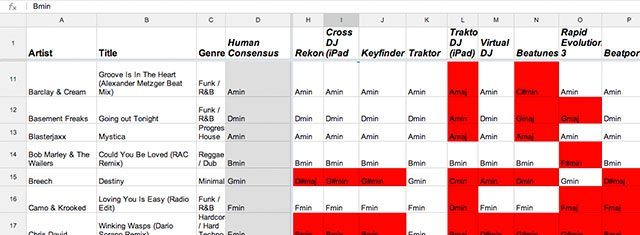
Each test was run twice to make sure there were no testing discrepancies – and we also eliminated any songs where there was no clear consensus among our human listeners.
You can access the full Google spreadsheet here – there’s a lot of interesting info in here that could be extrapolated, and even links to all the songs on Beatport if you want to listen in.
Want to dispute a key that we chose as the “correct” key for a song? As we noted earlier in the article, there’s always going to be a bit of disagreement on certain tracks – which is why we ran a control test.
One last note from the editor: this article has in no way been sponsored, endorsed, or even asked for by any of the involved software developers. It was fueled entirely by fruit snacks and hours of clicking, listening, and analyzing.


